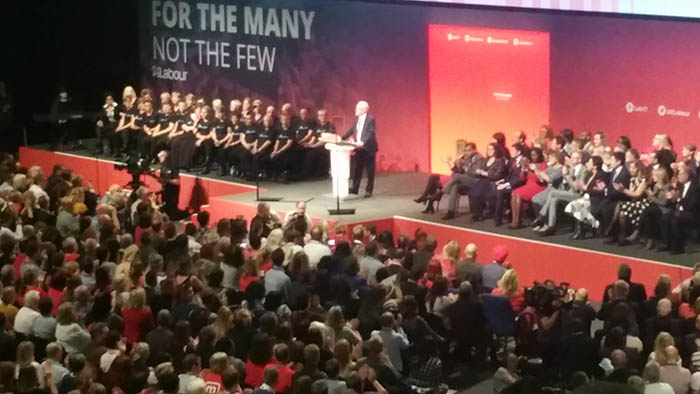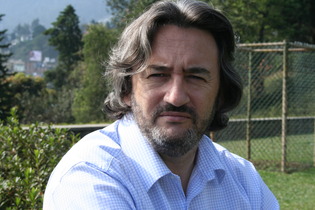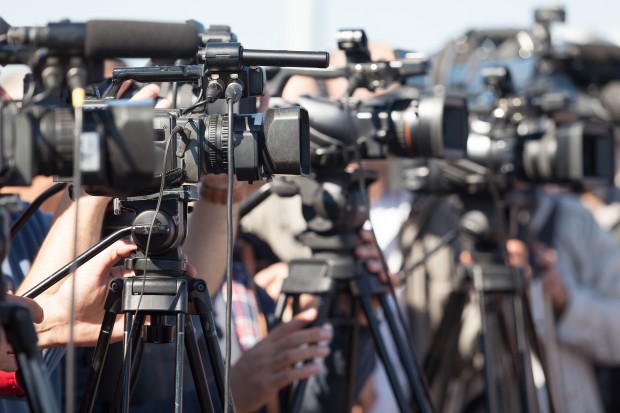Index relies entirely on the support of donors and readers to do its work.
Help us keep amplifying censored voices today.
[vc_row][vc_column][vc_column_text]

Jeremy Corbyn speaks at Labour Party conference in Brighton, September 2017. Credit: DaveLevy/Flickr
During his first speech at conference as Labour Party leader in September 2015, Jeremy Corbyn called for an end to “personal abuse” and urged delegates to “treat people with respect”.
“Cut out the cyber-bullying and especially the misogynistic abuse online,” he added. “I want kinder politics.”
Two years on the message hasn’t gotten through.
On 24 September 2017, the second day of this year’s party conference, BBC political editor Laura Kuenssberg was assigned bodyguards after receiving abusive threats online.
The BBC had also decided to bolster Kuenssberg’s personal protection during the general election in June after she faced threats over alleged bias in her reporting surrounding Labour leader Jeremy Corbyn. She has also been accused of partiality by Conservative and Ukip supporters.
“It is unprecedented that a journalist would need protection to do her job covering a political conference in the UK, which makes this all the more troubling,” Hannah Machlin, project manager for Index on Censorship’s’ Mapping Media Freedom project, said. “Laura’s case indicates that sexist online abuse against women journalists has become part of the job, and it’s affecting not only the safety of reporters but also a functioning free press.”
Two other journalists were refused entry altogether to the conference. On 23 September, Sussex police refused to give Huck magazine editor Michael Segalov a press security clearance required to attend. Segalov wrote that he applied for press accreditation three months prior to the conference but was informed the evening of 19 September that it had been denied based on the police’s refusal to grant him security clearance.
“Rather than provide reasons and rationale for our journalistic freedom being curtailed, the police said they would not divulge why they made their call,” Segalov wrote. He has never been arrested, charged or convicted of any crime.
“This might be a single incident, but the repercussions should it go unchallenged are worrying. The police restricting the rights of a journalist from attending a political event without giving any rationale, basis or reason puts our civil liberties on the line.”
On 24 September, Michael Walker, a left-wing journalist working for Novara Media, was also barred from entering by police.
“Barring reporters is a form of censorship,” Machlin added. “Political parties interfering with access to events undermines key parts of democracy and sends a clear message from the labour party to all other journalists.”
Earlier this year, Corbyn’s press team barred Buzzed from campaign events. On 9 May, in the run-up to the general election, a senior Corbyn aide told BuzzFeed News political editor Jim Waterson that his access was limited and that the website’s access to the Labour leader would be limited for the rest of the campaign. This was because of an interview with Corbyn published on 8 May had “disrupted media coverage of Labour’s launch event”, the website reported.
Buzzfeed published a piece quoting Corbyn that he remain as the party’s leader even if he lost the election. Corbyn told the BBC he had only said he would stay in power because they would win. BuzzFeed then published an extract of the interview, which showed they had quoted him accurately.
Waterson later regained access to the leader.
Such violations to media freedom are not limited to the Labour Party, however. Also in the run-up to the election, three journalists for Cornwall Live were shut in a room, prevented from filming and severely limited on what questions they could ask during Conservative prime minister Theresa May’s visit to a factory in Cornwall.
A reporter from Cornwell Live who was live-blogging the event wrote: “We’ve been told by the PM’s press team that we were not allowed to stand outside to see Theresa May arrive.”
On two occasions in April 2017, Conservative-run Thurrock Council in Essex said they would restrict access to journalists who “do not reflect the council’s position accurately”.
In the wake of the Grenfell Tower fire in June, the Kensington and Chelsea Council, which has been Conservative-run since 1964, tried to prevent journalists from attending its first after the atrocity. The council had sought to exclude the public and media from the cabinet meeting, arguing their presence would risk disorder. But after a legal challenge from five media organisations, a high court judge ordered the council to allow accredited journalists to attend half an hour before the meeting was due to start. [/vc_column_text][/vc_column][/vc_row][vc_row][vc_column][vc_basic_grid post_type=”post” max_items=”4″ element_width=”6″ grid_id=”vc_gid:1507044011187-4d3c340a-bdf9-4″ taxonomies=”6564″][/vc_column][/vc_row]
[vc_row][vc_column][vc_column_text]
Fergal Keane is a journalist who made his name as a war reporter at the end of millennium, covering conflicts from Congo and Rwanda to Kosovo. In 2003, the Index on Censorship recognised his efforts with their award for Outstanding Commitment to Journalism Integrity. It wasn’t Keane’s first award, and it wasn’t his last either. On top of his Orwell Prize (1996) and Amnesty International Press Award (1993) and Television Prize (1994), his OBE and his BAFTA (both from 1997), Keane has since added a Sony Gold award in 2009, for his inspiring Radio 4 series ‘Taking a Stand’, and the Ireland Funds Literary Award in 2015.
In 2004, following decades in the profession, Keane made the decision to stop entering active war zones. “I couldn’t justify potentially robbing my children of a father,” he told the Daily Telegraph in 2010. “I couldn’t do it anymore.” But despite a slight career shift, Keene continues his commitment to journalism and justice just as fervently. He is now a special correspondent for the BBC, still writing and broadcasting on topics like the refugee crisis, the Yemen conflict and the South Sudan civil war – though sometimes from afar – as well as often being dispatched to the latest scenes of terrorism in Europe, whether France, Belgium or Germany. Wherever he is, he retains an insight and awareness of historical context that few can match.
Beyond the BBC, he is also the author of several well-received books and in 2011 he received an honorary degree from the University of Liverpool, where he is now three years into a Professorial Fellowship. He is part of the university’s Institute of Irish Studies, teaching students on the Understanding Conflict masters programme.
Speaking to the university’s website in 2015, Fergal criticised the “endlessly reductive” mainstream press and urged his students to “always challenge your opinions with facts, every day of your life. You will only know what your opinions are worth if they are taken out of the box and subjected to the most severe tests. Facts, facts, facts.”
Not all Keane’s work is confined to journalism, however. In 2005, he founded Msaada, an NGO dedicated to assisting Rwandans – and Rwandan society – to recover from the 1994 genocide, through meaningful, income-generating projects. It continues to support such projects today.
Samuel Earle is a member of Index on Censorship’s Youth Advisory Board. He is a freelance writer and recent masters graduate from the London School of Economics and Political Science, where he studied Political Theory. He lives in Paris.[/vc_column_text][/vc_column][/vc_row][vc_row][vc_column width=”1/2″][vc_single_image image=”85476″ img_size=”full” alignment=”center” onclick=”custom_link” link=”https://www.indexoncensorship.org/2016/11/awards-2017/”][/vc_column][vc_column width=”1/2″][vc_column_text]
Seventeen years of celebrating the courage and creativity of some of the world’s greatest journalists, artists, campaigners and digital activists
2001 | 2002 | 2003 | 2004 | 2005 | 2006 | 2007 | 2008 | 2009 | 2010 | 2011 | 2012 | 2013 | 2014 | 2015 | 2016 | 2017[/vc_column_text][/vc_column][/vc_row][vc_row][vc_column][vc_basic_grid post_type=”post” max_items=”12″ style=”load-more” items_per_page=”4″ element_width=”6″ grid_id=”vc_gid:1492505799978-a5ad6490-9f12-5″ taxonomies=”4881, 8935″][/vc_column][/vc_row]

Each week, Index on Censorship’s Mapping Media Freedom project verifies threats, violations and limitations faced by the media throughout the European Union and neighbouring countries. Here are five recent reports that give us cause for concern.
The Russian state media regulator Roskomnadzor began blocking Krym Realii, the Сrimean edition of Radio Free Europe / Radio Liberty on Saturday 14 May.
A representative of Roskomnadzor confirmed that the regulator had blocked a page, which contains an interview with a leader of the Tatar Mejlis, at the request of the general prosecutor office. “Currently, Roskomnadzor is implementing measures for blocking and closing this website,” criminal prosecutor Natalia Poklonskaya told Interfax.
Krym Realii was established following the annexation of Crimea to Russia. Materials on the site are published in Russian, Ukrainian and Crimean Tatar languages.
Several editors at RBC media holding lost their jobs on 13 May following a meeting between top management with journalists. They include RBC editor-in-chief Elizaveta Osetinskaya, editor-in-chief of the RBC business newspaper Maksim Solyus, and RBC deputy chief editor Roman Badanin.
In a press release, RBC underlined that the dismissals were finalised as a mutual agreement of both parties, but sources from TV-Dozhd and Reuters claim managers have bowed to political pressure from the Kremlin.
The pressure against RBC began following investigations that have reportedly “irked the Kremlin“, including one on the assets of Vladimir Putin’s alleged daughter, Ekaterina Tikhonova.
#Croatia demands perpetrators be found after RTL TV journalist Petar Panjkota attacked at #Bosnia Serb protest pic.twitter.com/qCPVWVv5L0
— Balkan Newsbeat (@BalkanNewsbeat) May 15, 2016
Petar Panjkota, a journalist for the Croatian commercial national broadcaster RTL, was physically assaulted after he had finished a segment from the Bosnian town Banja Luka on 14 May.
Panjkota was reporting on parallel rallies in Banja Luka, the administrative centre of Bosnia’s Serb-dominated of Republika Srpska. He was reporting on protests organised by the ruling and opposition parties of the Bosnian Serbs. When he went off air, Panjkota was punched in the head by an unidentified individual, leaving bruises.
RTL strongly condemned the attack, calling it another attack on media freedom. No information has surfaced on the identity of the assailant.
On 12 May, the long-awaited white paper on the future of the BBC was unveiled. The BBC Trust is to be abolished and replaced by a new governing board including ministerial appointees. The board will be comprised of 12 to 14 members: the chair, deputy chair and members for each of the four nations of the UK will be appointed by the government and the remaining seats will be appointed by the BBC.
“It is vital that this appointments process is clear, transparent and free from government interference to ensure that the body governing the BBC does not become simply a mouthpiece for the government,” Jodie Ginsberg, CEO of Index on Censorship, said.
“Independence from government is essential for the BBC and these proposals don’t quite offer that,” Richard Sambrook, director of the Centre for Journalism at Cardiff School of Journalism, Media and Cultural Studies and former BBC journalist, told Index on Censorship. “There is no reason the board can’t be appointed by an arms length, independent panel. Currently the plans are too close to a state broadcasting model.”
Reporter of Kurdish news agency DIHA Sermin Soydan was arrested today becoming agency’s 13th imprisoned journalist pic.twitter.com/qhEC1BSbjg
— Mutlu Civiroglu (@mutludc) May 15, 2016
Two reporters working for Dicle News Agency (DİHA) reporters were detained in the eastern city of Van on 12 May. Nedim Türfent and Şermin Soydan were allegedly detained within the scope of an on-going investigation and taken to the anti-terror branch in the central Edremit district of Van.
Both were detained separately. According to Bestanews website, Nedim Türfent was detained when his car was stopped by state forces at the entrance of Van. Şermin Soydan was detained on her way to cover news in the city of Van.
Mapping Media Freedom
|
In restructuring the governance structure of the British Broadcasting Corporation, it is crucial that the government ensures the corporation’s independence and role as a public broadcaster not a state broadcaster.
The government has proposed replacing the current BBC Trust, the current governing body of the BBC, with a unitary board of 12-14 members that would be responsible for ensuring the BBC acts in the public interest. Half of the board members will be appointed by the BBC itself and the other half by a public appointments process, led by the government.
“It is vital that this appointments process is clear, transparent and free from government interference to ensure that the body governing the BBC does not become simply a mouthpiece for the government,” Jodie Ginsberg, CEO of Index on Censorship, said.